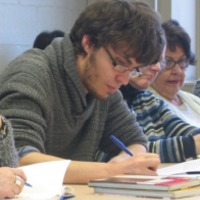
Edgar Straehle
Related Authors
Julio Alvear Tellez
Universidad del Desarrollo (UDD)
Víctor Samuel Rivera
Universidad Nacional de San Antonio Abad del Cusco
Janik Toscano
Universidad del Valle de Mexico
Victor Ansbergs
Universidad Nacional de Tucuman
Michaël Rabier
Ecole Pratique des Hautes Etudes
Daniel Gomes de Carvalho
Universidade de São Paulo
InterestsView All (20)










Uploads
Books by Edgar Straehle
Link: https://www.documentauniversitaria.com/es/producte/memoria-de-la-revolucion/
Ph. D. by Edgar Straehle
In order to complete this task, this research rests upon a deep and exhaustive examination of the works of Hannah Arendt from the perspective of authority and argues that this concept does not play a secondary or isolated role in her thinking. Authority is linked with one of the central problems for this thinker, that of the question of the world. Furthermore, authority is located at the very heart of other major issues, such as the concepts of power, violence, sovereignty, law, foundation, memory, revolution, judgment, common sense or, above all, the world. At the same time the concept of authority plays an important role in the understanding of Arendt‘s position in regard to the council system and it is useful to delve more deeply into other phenomena such as totalitarianism, civil disobedience, forgiveness, promise or both the activities of work and action.
In Arendt, authority is defined by characteristics such as its relational dimension and its dynamic character. In addition, authority is seen as a kind of resource which can counterbalance the unpredictable character inherent to action that at the same time does not negate its freedom or its spontaneity. On the other hand, authority provides a horizon of permanence that is not present in the Arendtian category of power and is crucial for the possibility or viability of the political foundation. As a result of this consideration, in the following pages I develop what I call a ―power of reception‖ and I will reconsider the concept of the author on the basis of Arendt‘s reflections. Finally, this work aims to tackle what the thinker considered as one of the major challenges for the current political thinking: the reconciliation of not freedom and equality but of equality and authority.
Papers by Edgar Straehle
Además, una decisión importante ha sido interrogar a Arendt y Benjamin no tanto desde sus influencias filosóficas como las históricas. Para ello, me he adentrado en la memoria de la Comuna y de la tradición revolucionaria francesa para conocer mejor las fuentes de inspiración de Benjamin o, para el caso de Arendt, la he analizado desde historiadores como R. R. Palmer, Jacques Godechot u Oskar Anweiler (antes de virar hacia la pedagogía). Con ello también se pretende mostrar las porosidades y la retroalimentación entre la historia y la filosofía.
Link: https://www.documentauniversitaria.com/es/producte/memoria-de-la-revolucion/
In order to complete this task, this research rests upon a deep and exhaustive examination of the works of Hannah Arendt from the perspective of authority and argues that this concept does not play a secondary or isolated role in her thinking. Authority is linked with one of the central problems for this thinker, that of the question of the world. Furthermore, authority is located at the very heart of other major issues, such as the concepts of power, violence, sovereignty, law, foundation, memory, revolution, judgment, common sense or, above all, the world. At the same time the concept of authority plays an important role in the understanding of Arendt‘s position in regard to the council system and it is useful to delve more deeply into other phenomena such as totalitarianism, civil disobedience, forgiveness, promise or both the activities of work and action.
In Arendt, authority is defined by characteristics such as its relational dimension and its dynamic character. In addition, authority is seen as a kind of resource which can counterbalance the unpredictable character inherent to action that at the same time does not negate its freedom or its spontaneity. On the other hand, authority provides a horizon of permanence that is not present in the Arendtian category of power and is crucial for the possibility or viability of the political foundation. As a result of this consideration, in the following pages I develop what I call a ―power of reception‖ and I will reconsider the concept of the author on the basis of Arendt‘s reflections. Finally, this work aims to tackle what the thinker considered as one of the major challenges for the current political thinking: the reconciliation of not freedom and equality but of equality and authority.
Además, una decisión importante ha sido interrogar a Arendt y Benjamin no tanto desde sus influencias filosóficas como las históricas. Para ello, me he adentrado en la memoria de la Comuna y de la tradición revolucionaria francesa para conocer mejor las fuentes de inspiración de Benjamin o, para el caso de Arendt, la he analizado desde historiadores como R. R. Palmer, Jacques Godechot u Oskar Anweiler (antes de virar hacia la pedagogía). Con ello también se pretende mostrar las porosidades y la retroalimentación entre la historia y la filosofía.
but on its domestication and resignification. Finally, the third shape, in which this outside is not envisaged as an ended reality but captured as a productivity or capital. Therefore,
this kind of capitalism fosters a production of subjectivity as the human capital, which not only pervades the different fields of existence but as well, under the figure of the prosumer, transforms consummation into production.
and tries to dissociate this concept from the concept of power in order to undo their identification and thereby the oblivion of the specific nature (or the history) of authority. Besides, this rereading must not be confused with an apology of authority but with an exploration about this complicated and ambivalent category. The key point of this distinction lies in that authority, unlike power, depends not on itself but on the other person, the person who acknowledges another one as authority. Therefore, authority can be compatible with freedom and can appear as an exteriority of power, which undermines it or even becomes a counterpower. Hence the logical endeavours of power to monopolize and instrumentalize authority.
Por eso, y más allá de los posicionamientos políticos inevitables en cada historiador, se han seleccionado sobre todo aquellos escritos que, hasta donde alcanza mi conocimiento, reconocen esa complejidad o que, de algún modo, ayudan a reflejarla. Así pues, el propósito ha sido el de evitar caer en interpretaciones instrumentalizadas o politizadas de la historia, y por supuesto también en las más simplistas. Por eso mismo, no solo es interesante tener en cuenta las obras mencionadas en sí mismas, sino también con qué otras se relacionan y de qué modo, al hacerlas dialogar o confrontar entre sí, pueden contribuir conjuntamente a recrear la dimensión real de lo sucedido. De ahí también que, más allá de los olvidos o ausencias que pueda contener, algunas simplemente debido a una falta de ciertas lecturas, es bastante probable que esta lista no satisfaga a casi nadie, pues deliberadamente hace referencia a textos que a veces se sitúan (o son situados) en un costado u otro de la contienda política. Su propósito, empero, no es tanto conciliador como el de buscar puentes desde donde intentar favorecer una relación lo más sana posible con el pasado, una no meramente condenatoria o apologética, una más llena de matices, aristas y ambigüedades, obviamente por "ambos lados".
¿Puede haber una tradición revolucionaria? ¿Es eso una contradicción que intenta juntar dos elementos en verdad antagónicos? ¿Se trata de una realidad que se repite época tras época? ¿Se trata de un rasgo pasado de la revolución que, a causa de la llamada crisis de la tradición, se ha perdido? ¿Y esa supuesta tradición revolucionaria debería cultivarse o, por el contrario, evitarse? ¿Es la relación con el pasado una losa o un apoyo? ¿Quizá una necesidad que se debería llevar a cabo de la mejor manera posible?
Link: https://derehistoriographica.wordpress.com/2018/12/07/diez-observaciones-sobre-la-nueva-extrema-derecha-una-aproximacion-desde-hannah-arendt/
Enlace: https://moreno-pestana.blogspot.com/2020/05/nuria-peist-y-edgar-straehle-sobre.html